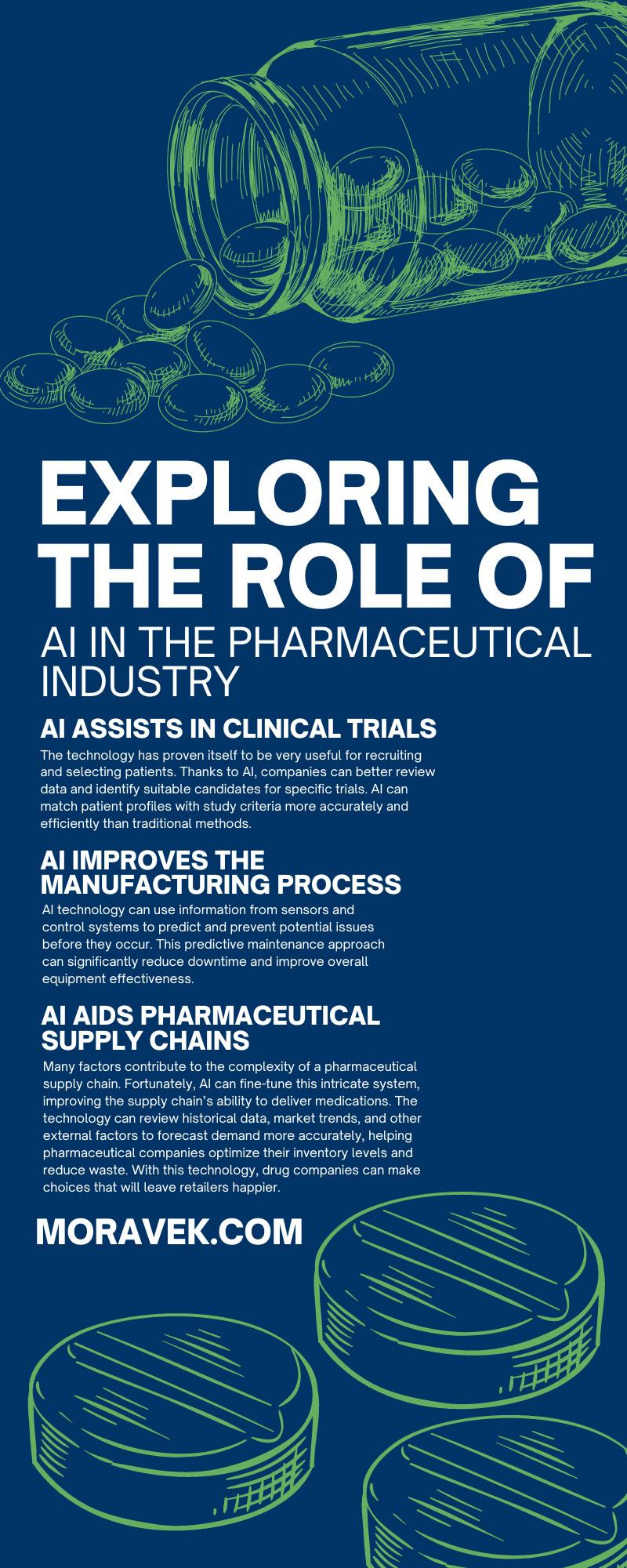
We have felt the launch of artificial intelligence (AI) everywhere, even in the pharmaceutical sector. The technology is proving itself to be an invaluable ally in accelerating processes, enhancing accuracy, and unlocking new possibilities for drug companies. Read on to explore the role of AI in the pharmaceutical industry and how it is affecting areas of this vital sector, including manufacturing and supply chains.
AI Is Changing the Drug Discovery Process
The drug discovery process has traditionally been a time-consuming and expensive endeavor, often taking years and costing billions. AI has been especially useful on this front by shrinking the time and costs involved. The technology can review molecular structures, biological interactions, and clinical outcomes to find promising compounds that conventional methods may have overlooked.
Furthermore, AI-powered systems can simulate drug-target interactions and predict the potential side effects. This simulation speeds up the discovery process and helps pharmaceutical companies allocate their resources more efficiently.
They can use this technology to ensure they only focus on drug candidates with the highest likelihood of success. As a result, AI enables the industry to explore a broader range of therapeutic possibilities and potentially bring life-saving medications to patients even faster than ever before.
AI Assists in Clinical Trials
The technology has proven itself to be very useful for recruiting and selecting patients. Thanks to AI, companies can better review data and identify suitable candidates for specific trials. AI can match patient profiles with study criteria more accurately and efficiently than traditional methods.
AI can also assist in monitoring clinical trial data. Advanced analytics can detect patterns and anomalies in real-time, allowing researchers to identify potential safety issues or efficacy signals earlier in the trial process. These advanced analytics also improve patient safety helps pharmacists make more informed decisions about whether to continue, modify, or terminate a trial.
AI Improves the Manufacturing Process
Like the drug discovery process, pharmaceutical manufacturing is highly complex, requiring precise control over numerous variables to ensure product consistency. AI is making significant inroads in this area, optimizing manufacturing processes and improving quality control.
AI technology can use information from sensors and control systems to predict and prevent potential issues before they occur. This predictive maintenance approach can significantly reduce downtime and improve overall equipment effectiveness.
Moreover, AI is enhancing manufacturing with computer vision and deep learning techniques. These technologies can inspect products at speeds and levels of accuracy that surpass human capabilities, allowing them to detect even minor defects or inconsistencies.
AI can also be an asset to this process by spotting any conditions that threaten the workers’ safety or manufacturing efficiencies. This level of precision ensures that employees operate in a much less risky and much more productive environment, allowing drug companies to reduce their costs and accident rates. Such reductions can add to the savings that a company can enjoy and enhance its reputation within the market.
AI Aids Pharmaceutical Supply Chains
Many factors contribute to the complexity of a pharmaceutical supply chain. Fortunately, AI can fine-tune this intricate system, improving the supply chain’s ability to deliver medications. The technology can review historical data, market trends, and other external factors to forecast demand more accurately, helping pharmaceutical companies optimize their inventory levels and reduce waste. With this technology, drug companies can make choices that will leave retailers happier.
AI is also enhancing supply chain visibility and traceability, which is particularly important in the pharmaceutical industry due to its stringent regulatory requirements and the need to prevent counterfeit drugs. Blockchain technology, combined with AI, can create secure, transparent supply chains where it records and verifies every step of a product’s journey.
Additionally, AI-powered route optimization and predictive analytics can improve logistics efficiency, ensuring that medications reach patients when and where they need them most, even in challenging or emergency situations. Pharmaceutical companies can take pride in knowing that their supply chains operate efficiently and effectively and that their products can bring comfort to customers.
AI Optimizes Marketing Processes
Even after the drug has hit the market, AI can play an important role for pharmaceutical companies. With AI-powered analytics, companies can gain deep insights into patient opinions and market trends, allowing them to create better marketing strategies. Thanks to the technology, drug firms can develop ad campaigns that will reach and raise awareness among the people who will benefit from using it.
Pharmaceutical firms can even use AI to assist them in creating a better image for their company and respond to consumer concerns about their products. Firms that promptly respond to consumer concerns by developing a better drug improve the consumers’ health conditions and enjoy strong sales for their medications, which is a win-win for both sides.
AI Advances Patient Data Security
Just as AI can help keep workers safe in the manufacturing process, it can do the same for patients even after the drug has earned approval and reached the market. After reviewing their medical records, physicians can use this technology to determine which medications and dosages would be right for their patients. Doctors can also use AI devices to monitor the patient’s health. The system can also send the patient prompts so that they do not miss times when they must take their medications.
Pharmacists can also use this technology to ensure that they are not giving customers a dangerous dosage or something that may conflict with another medication they might be taking. In a way, these applications allow AI to play a critical role in maintaining patient care.
AI Can Repurpose Other Medications
One last role that AI can play in the pharmaceutical sector is helping companies find new uses for products that they previously released. This technology can assist them in repurposing these drugs to treat emerging health conditions, allowing the drug to have a second life in helping patients get better.
These examples show that AI is revolutionizing the pharmaceutical industry across multiple spheres and proving to be an indispensable tool in the pursuit of better healthcare outcomes. Your company can also achieve better outcomes by using Moravek’s radiolabeling services. We have an extensive history of providing quality services and custom APIs for many firms and organizations and are ready to do the same for you.

